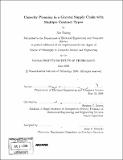Capacity planning in a general supply chain with multiple contract types
Author(s)
Huang, Xin, 1978-
DownloadFull printable version (10.48Mb)
Other Contributors
Massachusetts Institute of Technology. Dept. of Electrical Engineering and Computer Science.
Advisor
Stephen C. Graves.
Terms of use
Metadata
Show full item recordAbstract
In this thesis, we study capacity planning in a general supply chain that contains multiple products, processes, and resources. We consider situations with demand uncertainty, outsourcing contracts, and option contracts. We develop efficient and practical algorithms to address the following three questions: which suppliers should the manufacturer select, which types of contracts should it use, and how much capacity should it reserve. Through the model and algorithms, we study the properties of, and draw managerial insights about the optimal capacity planning strategy. First, we propose a model to study the single period capacity planning problem. We provide closed-form representations of the optimal capacity planning strategy for two special supply chain structures. We then develop a stochastic linear programming algorithm to solve the general single period problem and show that our algorithm outperforms the alternative algorithms by means of an empirical study. With the model and algorithm, we then study the effects of demand uncertainty, prices, common processes, and option contracts on the optimal capacity planning strategy. We conclude with a discussion on how to include lot size constraints into the model. Second, we develop a decomposition method for the single period capacity planning problem under the assumption that each process has only one dedicated resource. The algorithm provides both a feasible solution and an upper bound on the profit of the capacity planning problem. We test the effectiveness of the feasible solution and the tightness of the upper bound in the single period problem through a series of randomly generated test cases. The result shows that the algorithm performs fairly well with an average error of 1.48% on a set of test cases. Third, we extend the capacity planning model into a multi-period setting. (cont.) We solve a special case of the multi-period problem by transforming it into a shortest-path problem. We use the algorithm for the single period problem, the decomposition method, and the result from the special case to develop an efficient heuristic algorithm to solve the general multi-period problem. The same algorithm also generates an upper bound of the problem. We then test the heuristic algorithm and upper bound through several sets of test cases. Each test case is a 12-period capacity planning problem with 7 products, 14 processes, 14 resources, and 4 contracts for each resource. We can solve these problems with an average error of 1.17%.
Description
Thesis (Ph. D.)--Massachusetts Institute of Technology, Dept. of Electrical Engineering and Computer Science, 2008. Includes bibliographical references (leaves 147-150).
Date issued
2008Department
Massachusetts Institute of Technology. Department of Electrical Engineering and Computer SciencePublisher
Massachusetts Institute of Technology
Keywords
Electrical Engineering and Computer Science.